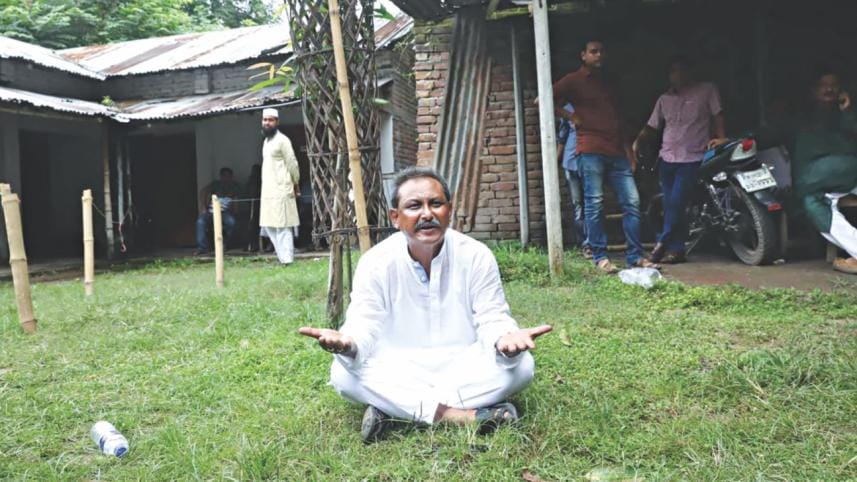An uneven battlefield

Among all ruling party-backed candidates in the three-city elections, Khairuzzaman Liton, in Rajshahi, seemed to be the most desperate one. He—or his campaign—spent approximately three times the campaign spending limit only by publishing hundreds of thousands of posters, banners and festoons, according to an estimate by Prothom Alo.
Liton's aggressive campaign strategy left his BNP-backed opponent, Mosaddek Hossain, the incumbent mayor, with little space. "There is literally no prominent place in the city left for us to hang or put up our posters," Mosaddek's chief election agent, Tofazzal Hossain, told the Bengali paper.
Liton's aggressiveness was coupled with the local police's heavy-handedness against BNP—more than a hundred of the party's activists were arrested by the police in the run-up to the election.
With reports of AL activists taking control of polling centres and heavy ballot stuffing, half the polling centres saw a highly unusual turnout of over 80 percent. In the end, Liton emerged "victorious" in all but four of the 134 polling centres in the city, while Mosaddek, who won in 113 centres last time, had little to do except for staging a sit-in.
***
Barisal's electoral outcome was even more incomprehensible. The ruling-party backed candidate, Serniabat Sadiq Abdullah, won by eight times the vote received by his opponent, Mujibur Rahman Sarwar. The margin was, perhaps, unprecedented in the history of city polls.
True, the field was very uneven for Sarwar with little space for campaigning and hundreds of his activists arrested. Even then, the result does not seem to reflect any semblance of reality.
Barisal is known to be a proven BNP stronghold. From 1991, the BNP-nominated candidate always won in the Barisal-5 parliamentary seat, which covers almost the entire city corporation area, barring the 2014 election which the party boycotted. Even in the 2008 parliamentary election, when the BNP suffered its worst nationwide result, its candidate won in the Barisal-5 seat. The incumbent mayor of the city, Ahsan Habib Kamal, was from the party.
Understandably, things got uglier on election day as AL activists reportedly took control of almost all polling centres across the city. "I was elected member of parliament for four times and mayor of the city for one term," Sarwar said. "Never in my life have I seen anything like this."
***
Unlike the other two electoral fields, the result was not a foregone conclusion in Sylhet, thanks to the city's courteous political culture. Ariful Haque Chowdhury, the BNP-backed incumbent, is a combative politician. Unlike his party colleagues in Barisal and Rajshahi, he did not watch silently while his activists were detained by the police. He went straight to the police station and staged an indefinite sit-in before the police agreed to release them, albeit with the help of his generous opponent, Badar Uddin Ahmed Kamran.
Kamran, in contrast, was a bit nervous. While introducing his electoral manifesto to journalists, the former two-time AL mayor couldn't hold back his tears as he described the fight as possibly his last.
The political equation was also a bit complicated and, shall we say, ironic. Ariful's biggest blow came from a very unlikely bloc: his party's long-term ally, Jamaat-e-Islami, which unusually resisted calls from BNP to withdraw its candidate in Sylhet. Interestingly, Ehsanul Mahbub Jubayer, the Jamaat-backed candidate, enjoyed a relatively tolerant treatment from the police during the campaigning.
On the other hand, the development mantra, the Awami League's central electoral message, proved uncomfortable for its candidate in Sylhet. A large chunk of the city corporation area falls under the prestigious Sylhet-1 parliamentary seat, currently held by the Finance Minister Abul Maal Abdul Muhith, who has facilitated a good number of development projects in his constituency. Ariful, therefore, was in a position to claim credit for those projects, forcing Kamran to avoid attacking the incumbent mayor on the issue of development.
If the election was held in a free and fair manner, the fight would be very close—at least everyone thought so. In the end, it indeed proved to be a close fight, but the ground was so uneven for the BNP candidate that he might have won big time if things had been on an equal footing. In fact, having seen his election agents forcefully evicted in many polling centres, Ariful even decided to reject the election, only to revert his decision as the initial results started to paint a brighter picture than what he had anticipated. In the end, defying current trends, Ariful all but pulled off a startling electoral surprise.
***
The recently concluded five-city elections had many things in common, but the most blatant was, perhaps, the Election Commission's sheer lack of ability or willingness in maintaining fairness on the ground. The EC watched silently as the police paid no heed to its directives and arrested opposition activists and workers. With practically zero control over the local administration, the election day in all five cities proved to be a total disaster.
With the national election approaching, these elections were the one last chance for the EC to redeem itself, prove its credibility and reclaim its constitutionally designated position, but it chose not to do so. And, this should serve as an indictment of the deteriorating state of our democratic index and institutions.
Nazmul Ahasan is a member of the editorial team, The Daily Star.




Comments